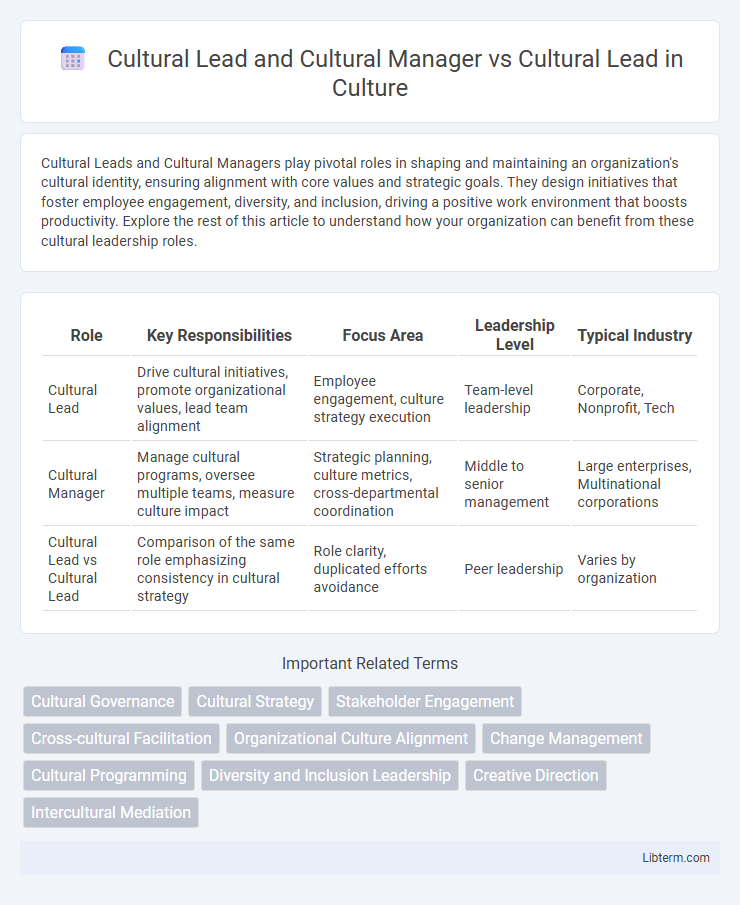Cultural Leads and Cultural Managers play pivotal roles in shaping and maintaining an organization's cultural identity, ensuring alignment with core values and strategic goals. They design initiatives that foster employee engagement, diversity, and inclusion, driving a positive work environment that boosts productivity. Explore the rest of this article to understand how your organization can benefit from these cultural leadership roles.
Table of Comparison
| Role | Key Responsibilities | Focus Area | Leadership Level | Typical Industry |
|---|---|---|---|---|
| Cultural Lead | Drive cultural initiatives, promote organizational values, lead team alignment | Employee engagement, culture strategy execution | Team-level leadership | Corporate, Nonprofit, Tech |
| Cultural Manager | Manage cultural programs, oversee multiple teams, measure culture impact | Strategic planning, culture metrics, cross-departmental coordination | Middle to senior management | Large enterprises, Multinational corporations |
| Cultural Lead vs Cultural Lead | Comparison of the same role emphasizing consistency in cultural strategy | Role clarity, duplicated efforts avoidance | Peer leadership | Varies by organization |
Introduction to Cultural Lead and Cultural Manager Roles
Cultural Lead and Cultural Manager roles both focus on shaping and sustaining organizational culture, with the Cultural Lead emphasizing strategic vision and cultural alignment across teams. The Cultural Manager typically handles day-to-day implementation of cultural initiatives, ensuring engagement and adherence to company values. Understanding these distinctions clarifies responsibilities around culture development, communication, and employee experience management.
Defining Cultural Lead: Key Responsibilities
A Cultural Lead is primarily responsible for shaping and promoting an organization's cultural identity by aligning company values with employee behavior and engagement initiatives. Unlike a Cultural Manager who may focus more on the operational aspects and implementation of cultural programs, the Cultural Lead defines strategic cultural goals, influences leadership mindset, and drives change to cultivate an inclusive, motivated workplace. Key responsibilities include facilitating cross-departmental collaboration, embedding core values into daily practices, and measuring cultural impact through employee feedback and performance metrics.
Who is a Cultural Manager?
A Cultural Manager oversees the development and implementation of cultural strategies, managing projects that enhance organizational culture and employee engagement. Unlike a Cultural Lead, who primarily guides cultural initiatives within teams, the Cultural Manager has broader responsibilities including budget management, stakeholder coordination, and aligning cultural goals with business objectives. This role requires strong leadership skills and expertise in change management to drive sustainable cultural transformation.
Overlapping Duties: Where Roles Converge
Cultural Lead and Cultural Manager both focus on driving organizational culture initiatives, employee engagement, and fostering a collaborative work environment. These roles overlap significantly in developing and implementing cultural strategies, maintaining internal communication, and supporting diversity and inclusion programs. Both positions require strong leadership to align company values with employee experiences, though the Cultural Manager may emphasize operational execution while the Cultural Lead focuses on strategic vision.
Core Differences: Cultural Lead vs Cultural Manager
A Cultural Lead primarily focuses on guiding and shaping the organizational culture by influencing employee behavior and promoting shared values, while a Cultural Manager emphasizes implementing and managing cultural programs and initiatives to ensure alignment with business goals. The Cultural Lead acts as a strategic influencer fostering culture change at a high level, whereas the Cultural Manager is responsible for the operational execution and day-to-day management of culture-related activities. Core differences lie in their scope, with the Cultural Lead driving vision and mindset shifts, and the Cultural Manager handling practical application and program administration.
Skills and Qualifications Needed
Cultural Lead roles require strong leadership skills, cultural intelligence, and the ability to manage cross-functional teams while aligning organizational culture with business strategy. Cultural Managers focus more on operational skills, including program development, stakeholder engagement, and monitoring cultural initiatives to ensure consistent implementation. Both positions demand excellent communication, emotional intelligence, and experience in change management, but Cultural Leads emphasize strategic vision and innovation in cultural transformation.
Impact on Organizational Culture
Cultural Leads and Cultural Managers both drive the development and maintenance of organizational culture, but Cultural Leads typically focus on strategic influence and embedding core values across all levels, fostering long-term cultural alignment. Cultural Managers tend to oversee the operational execution of culture initiatives, managing programs and ensuring consistent practice within teams. Their impact on organizational culture differs in scope, with Cultural Leads shaping the vision and Cultural Managers facilitating day-to-day cultural engagement.
Leadership vs Management in Cultural Settings
Cultural Lead focuses on inspiring vision, fostering team motivation, and guiding cultural initiatives through innovative leadership, emphasizing influence and change. Cultural Manager prioritizes planning, organizing resources, and executing cultural projects efficiently, emphasizing operational control and administrative oversight. While a Cultural Lead drives cultural transformation and strategic direction, a Cultural Manager ensures consistent implementation and sustainability of cultural programs.
Choosing the Right Role for Your Organization
Choosing the right role between a Cultural Lead and a Cultural Manager depends on your organization's size, goals, and culture complexity. A Cultural Lead typically drives vision and inspiration around company values, fostering engagement and alignment, while a Cultural Manager focuses on executing programs, managing initiatives, and measuring culture-related outcomes. Organizations seeking strategic cultural transformation benefit from a Cultural Lead, whereas those needing structured implementation and operational consistency require a Cultural Manager.
Future Trends in Cultural Leadership and Management
Cultural Leads and Cultural Managers play crucial roles in shaping organizational culture, with Cultural Leads primarily focusing on strategic vision and cultural innovation, while Cultural Managers concentrate on operational implementation and team engagement. Future trends in cultural leadership emphasize digital transformation, diversity and inclusion integration, and leveraging data-driven insights to enhance workplace culture. Embracing adaptive leadership models and fostering continuous learning environments will increasingly define success in cultural management and leadership roles.
Cultural Lead and Cultural Manager Infographic

 libterm.com
libterm.com